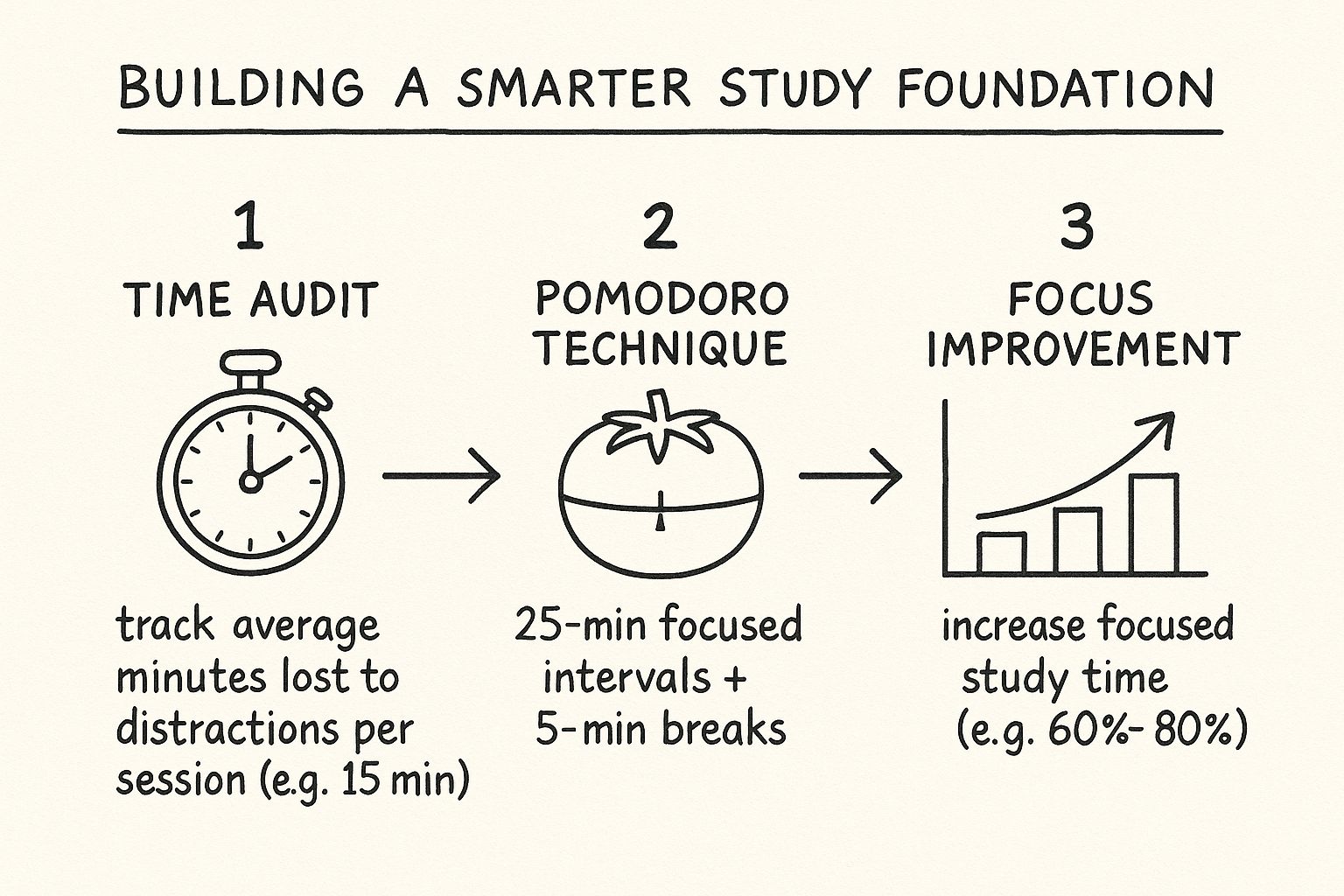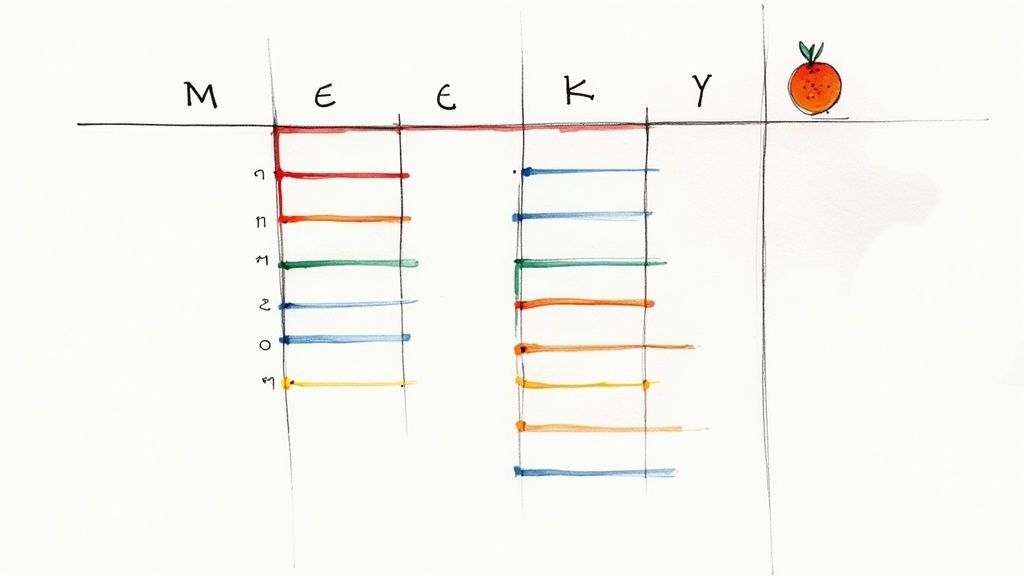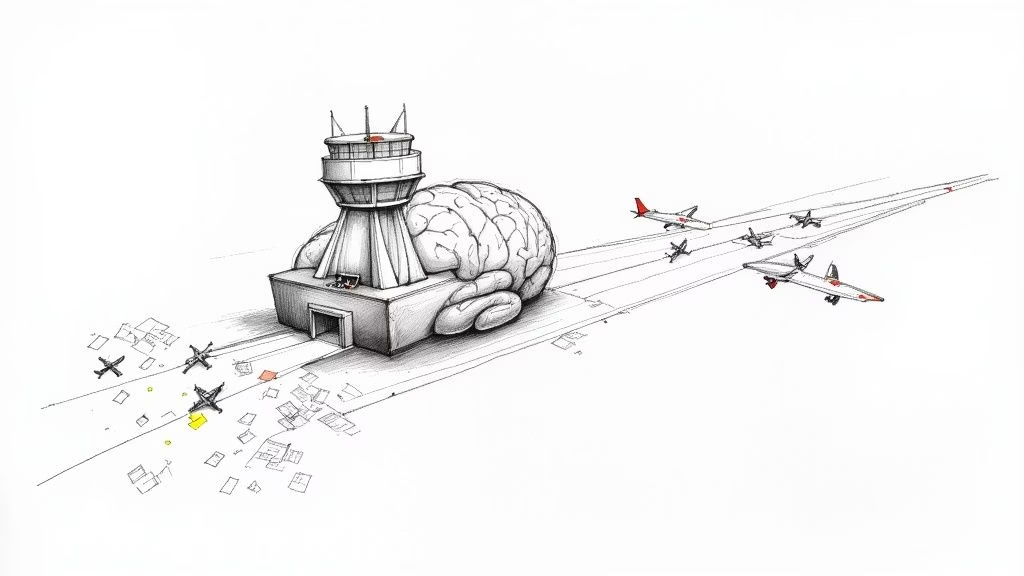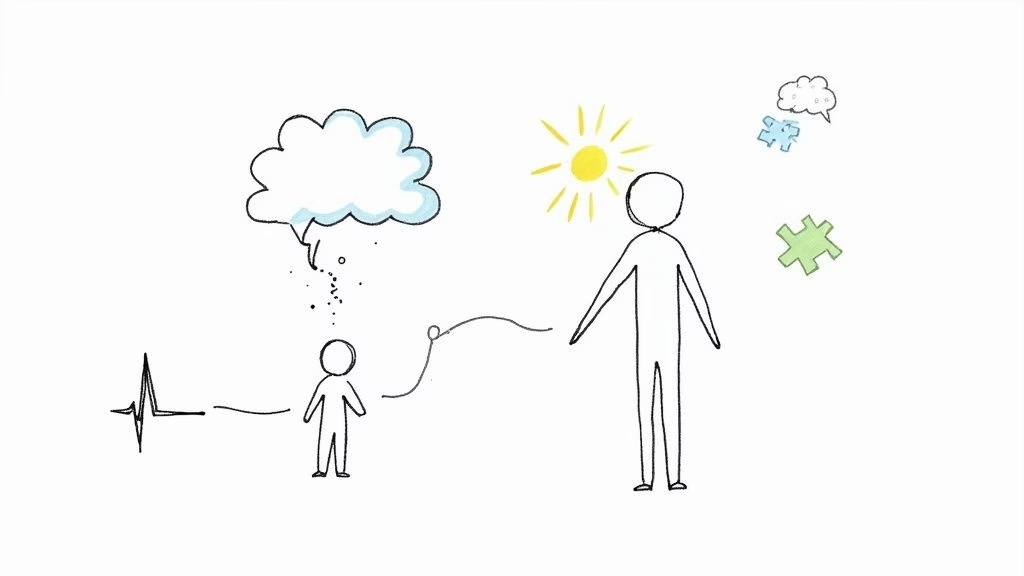Let's be real—building better study habits isn't about becoming a robot. It’s about creating a smart, sustainable system that actually works for you. This means mastering simple but powerful techniques like the Pomodoro method for focused learning, building a routine you can stick to, and remembering that your mental health is the foundation for any academic success.
Building a Smarter Study Foundation
Ever stared at a textbook until your eyes glazed over, feeling completely overwhelmed? We've all been there. But that feeling doesn't have to be your default. Learning how to improve your study habits isn't about some massive, overnight personality change. It's about stringing together small, consistent actions that cut down on stress and, over time, lead to huge results.
This guide is packed with real strategies for teens who are tired of fighting procrastination, disorganization, and that all-too-familiar study anxiety.
Forget the pressure to be perfect. Our goal here is to develop a system that gives you more confidence and control over your schoolwork. We'll get into practical methods that help you focus, manage your time, and stay motivated without hitting burnout. A huge piece of this puzzle is learning effective strategies to increase focus and concentration while studying.
From Distraction to Deliberate Action
First things first: you need to figure out where your time is actually going. So many students lose huge chunks of their study sessions to distractions without even realizing it. A quick "time audit" can shine a light on these patterns, giving you the power to reclaim your focus. It’s a simple shift from passively letting time slip away to actively owning your attention.
The infographic below breaks down a simple, three-step process for turning this awareness into better performance.

As you can see, it starts with tracking your distractions, moves to implementing a structured method like the Pomodoro Technique, and ends with measuring your progress. It’s a clear path from identifying the problem to actually solving it.
Building effective habits is less about willpower and more about structure. By creating a routine you can actually follow, you remove the daily decision of whether to study and replace it with a simple plan for how to study.
This isn't just a hunch; it's backed by a ton of research. One massive meta-analysis confirmed that effective study habits are directly tied to better grades at all levels. Students who used structured, consistent study methods—like prepping for tests and doing classroom exercises—were more engaged and performed better.
Ultimately, these habits aren't just about grades. They’re about building skills that will serve you for the rest of your life. Mastering how to manage your time and attention will help you succeed long after you've handed in your last assignment. Strong study skills are also directly linked to better information processing; you can dive deeper into that connection in our guide on how to improve memory retention.
Crafting a Realistic Study Routine

Let’s be honest: the best study plan is the one you actually stick with. Forget those rigid, color-coded, hour-by-hour schedules that fall apart the second a friend calls. We're going to build a flexible routine that works with your life, not against it.
It starts with a simple "time audit." For just a couple of days, track where your hours are really going—scrolling TikTok, homework, gaming, chores. No judgment here. You're just collecting data to find those hidden pockets of time you never knew you had. This honest look is the foundation for a routine you can actually maintain.
The Power of the Pomodoro Technique
If procrastination is your biggest enemy, the Pomodoro Technique is your secret weapon. It’s incredibly simple but shockingly effective. The idea is to work in short, focused sprints with breaks in between, which makes even the most daunting tasks feel manageable.
Here’s the breakdown:
- Set a timer for 25 minutes and go all-in on a single task. No phone, no distractions.
- When the timer dings, take a 5-minute break. Get up, stretch, grab a snack—anything but work.
- After four of these "Pomodoros," give yourself a longer break of 15-30 minutes.
This rhythm trains your brain to concentrate without burning out. It shifts the narrative from "I have to study for three hours straight" to "I just need to focus for 25 minutes." That small mental switch can be a total game-changer for your motivation and grades.
To get started, here’s a simple template you can use to map out your study sessions for the week.
Your Weekly Pomodoro Study Planner
| Time Slot | Monday | Tuesday | Wednesday | Thursday | Friday |
|---|---|---|---|---|---|
| 4:00-4:25 PM | Math (Pomodoro 1) | History (Pomodoro 1) | Science Lab (Pomodoro 1) | Math (Pomodoro 1) | Free Time |
| 4:25-4:30 PM | 5-min Break | 5-min Break | 5-min Break | 5-min Break | Free Time |
| 4:30-4:55 PM | Math (Pomodoro 2) | History (Pomodoro 2) | Science Lab (Pomodoro 2) | Math (Pomodoro 2) | Free Time |
| 4:55-5:00 PM | 5-min Break | 5-min Break | 5-min Break | 5-min Break | Free Time |
| 5:00-5:25 PM | English (Pomodoro 3) | Free Time | English (Pomodoro 3) | Spanish (Pomodoro 3) | Weekend! |
| 5:25-5:45 PM | Long Break | Free Time | Long Break | Long Break | Weekend! |
Remember, this is just a starting point. Adjust the times and subjects to fit your schedule and energy levels. The goal isn’t perfection; it’s consistency.
A consistent routine reduces decision fatigue. When you know when and how you're going to study, you waste less mental energy fighting the urge to procrastinate and can dive right into the work.
This kind of structure is especially helpful for teen guys who struggle with focus. It creates a predictable pattern and gives you a clear path forward, cutting through the overwhelm that so often leads to putting things off.
Mindfulness and Managing Procrastination
Procrastination isn’t about being lazy. More often than not, it’s a reaction to stress or anxiety. You avoid a task because it feels too big, or you’re afraid you won’t do it perfectly. This is where mindfulness can help quiet the mental noise.
Before you dive into a study session, try this simple meditation guide for teens:
- Sit down comfortably, with your feet flat on the floor.
- Close your eyes and take three slow, deep breaths. In through your nose, out through your mouth.
- Just notice the sensation of your breath. Don't try to change anything, just observe it.
- Your mind will wander. That's what minds do. When it does, gently bring your focus back to your breathing.
- Do this for just 2-3 minutes before you open your books.
This short pause can seriously lower your stress levels and sharpen your focus. It's a tool for managing the emotional side of studying, not just the academic side.
Resources for Young Men and Mental Health Support
It’s crucial to acknowledge that the pressure to perform can take a real toll on your mental health. For teen boys and young men, there's often an unspoken expectation to just tough it out, which can make it hard to talk about struggles. But reaching out for support is a sign of strength, not weakness.
- The Jed Foundation: Offers incredible resources for teens on how to manage emotional health and cope with the pressures of school.
- Boys Town National Hotline: This is a 24/7 crisis line with resources specifically geared toward teens and their families.
- Man Therapy: Uses humor to tackle the stigma around men's mental health, providing practical tools and resources.
- Local Men's Groups: Check for groups or mentorship programs in your community. Sometimes the best support comes from connecting with others who get it.
Parenting Tip: Try to create an environment where it’s safe to talk about stress, not just grades. Instead of asking, "Did you finish your homework?" try an open-ended question like, "How are you feeling about your workload this week?" This simple shift moves the conversation from performance to well-being, showing your teen that you’re on their team.
How to Stop Procrastinating and Find Your Motivation
Let’s be real for a second. The biggest thing standing between you and getting your work done probably isn’t how hard the material is. It’s just starting.
Procrastination is a powerful force, and it can leave you feeling stressed, overwhelmed, and completely stuck. But it's not a character flaw. It's not you being lazy. It’s a completely normal response to emotions like anxiety, perfectionism, or even the fear of failing.
When a massive project is looming, your brain sees a mountain to climb and decides it’s way easier—and safer—to just scroll through your phone instead. The first step to breaking that cycle is understanding that it's an emotional reaction, not a logical one.
Break the Cycle with Micro-Commitments
The secret to getting past that initial resistance is to make the task seem ridiculously, almost laughably, small. This is where the 'Two-Minute Rule' is a game-changer.
The idea is dead simple: commit to doing something for just 120 seconds. That's it. Anyone can do anything for two minutes, right?
Open your textbook and just read one paragraph. Write the first sentence of your essay. Solve a single math problem. More often than not, that tiny action is all it takes to build a little momentum. Starting is always the hardest part, and the Two-Minute Rule is a way to trick your brain into getting over that hump. If you want to dive deeper into this, we've put together a full guide on how to stop procrastinating.
Find a Real Reason to Care
Motivation that actually lasts is rarely about getting an A on a single test. It’s about seeing how that test fits into the bigger picture—your picture.
If schoolwork just feels like a list of pointless tasks, of course you’re going to put it off. The key is to find a personal connection. How does mastering algebra help you design that video game you dream of creating? How does understanding history give you context for the world issues you actually care about?
When you can link your assignments to your own interests and long-term goals, they stop being chores. They become steps on a path you’ve chosen for yourself.
"True motivation comes from a sense of purpose. When you understand the 'why' behind your efforts, the 'how' becomes much easier to figure out."
This internal drive is far more powerful than any nagging from parents or teachers. Research backs this up, showing a strong link between study habits and academic results. One study found that students with strong motivation and time management performed way better in a tough Statistics class. On the flip side, things like weak note-taking skills held others back, proving that your personal study habits often matter more than the school itself.
Resources for Teen Guys and Young Men
For teen guys struggling with school, the pressure to have it all figured out can feel intense. Sometimes, procrastination isn’t just about avoiding homework; it’s about avoiding the feeling of not being good enough. It's crucial to know that reaching out for support is a sign of strength, not weakness.
- Men's Groups: Organizations like The Man Cave or even local community centers often run programs that provide mentorship and a safe space for young men to talk about what’s really going on.
- A Call to Men: This organization focuses on promoting healthy, respectful manhood and offers valuable perspectives on navigating the pressures you face.
- Coaching and Mentorship: Working one-on-one with a coach or mentor can give you personalized strategies and accountability, helping you build confidence and find a sense of direction that goes way beyond schoolwork.
A Quick Tip for Parents: The way you talk about school matters. Instead of asking, "Is your homework done?" try, "What's one thing you learned today that you thought was interesting?" This simple shift moves the focus from a checklist to genuine curiosity, creating an environment where motivation can actually grow.
Mindfulness and Mental Health for Better Focus

Let's be real: your brain isn't a machine. You can't just expect it to run on high-performance mode 24/7 without any maintenance. It needs rest, care, and a little bit of quiet to actually do its job well. This is where so many study guides miss the mark—they focus on planners and timers but forget the most important part of the equation: you.
Building great study habits is about more than just managing your time. It’s about managing your mind.
When you're feeling stressed, anxious, or totally overwhelmed, your brain’s ability to soak up new information just shrinks. So, taking care of your mental health isn't a distraction from your schoolwork. It's the foundation for becoming a more focused and resilient student.
Quieting the Noise with Simple Mindfulness
Mindfulness sounds complicated, but it's really just about paying attention to right now, without judging yourself. It’s an incredible tool for calming the pre-exam jitters or the dread that can build up before a tough study session. Think of it as hitting a mental reset button, clearing out all the clutter so you can actually focus.
You don't need to meditate for an hour to feel a difference. Just a few minutes of intentional breathing can change everything. Practices like Pranayama for anxiety relief are amazing for settling your nervous system and getting you ready to learn.
A Quick Meditation Guide for Teens
Before you even crack open a textbook, give this a shot. It's a simple meditation designed to ground you in the present and shake off those pre-study nerves.
- Get comfortable. Sit upright but relaxed, with your feet on the floor and hands in your lap.
- Close your eyes. Take a slow, deep breath in through your nose, then let it all out through your mouth. Do this three times.
- Focus on your breath. Don’t try to change it. Just notice how it feels as the air moves in and out.
- Let thoughts drift by. Your mind will wander. That’s totally normal. When a thought pops up, just notice it and gently bring your attention back to your breath.
- Stay here for 2-3 minutes. When you're ready, slowly open your eyes and just notice how you feel.
This simple exercise trains your brain to let go of distractions. For more strategies to sharpen your concentration, check out my full guide on how to focus while studying.
Resources for When You Need More Support
Sometimes, you need more than a few deep breaths. That’s completely okay. The pressure on teens today is intense, and knowing where to turn for help is a sign of strength, not weakness.
Here are a few incredible mental health resources I trust:
- The Trevor Project: Offers 24/7 crisis support specifically for LGBTQ young people.
- Crisis Text Line: Text HOME to 741741 from anywhere in the US. You'll connect with a trained crisis counselor for free, confidential support.
- NAMI (National Alliance on Mental Illness): Provides tons of information, support groups, and resources for teens and families navigating mental health conditions.
Recognizing you need support and actually reaching out for it is one of the bravest things you can do for your academic success and your life.
Specific Support for Teen Boys and Young Men
Guys, I see you. You often face a unique kind of pressure to "be strong" and bottle things up. This can make it feel impossible to talk about anxiety, depression, or just feeling buried by schoolwork. But you're not alone, and there are resources out there specifically for you.
For a lot of young men, the pressure to succeed academically, mixed with social expectations, leads to procrastination and a total drop in motivation. This isn't a character flaw—it's a signal that something deeper needs attention.
Organizations That Get It:
- HeadsUpGuys: A fantastic resource dedicated to helping men fight depression with practical, no-nonsense tips and info.
- The Man Cave: An Australian organization that runs programs to promote healthy masculinity and emotional intelligence in boys.
- Local Men's Groups: Try searching for "teen boys support groups" or "young men's mentorship programs" in your area. Finding a local community can provide a safe space to talk and grow.
A Tip for Parents
Want to truly support your teen’s mental health? Shift the conversation. Instead of leading with, "How'd you do on your history test?" try asking, "How are you feeling about your classes this week?"
This small change opens the door to a real conversation about their well-being, not just their performance. It shows them you care about them as a person first, and that can make all the difference.
How Parents Can Support Without Adding Pressure
Watching your teen struggle with schoolwork is tough. Your first instinct is probably to jump in and fix things, but that can backfire, adding more pressure instead of relieving it. The goal isn't to become your teen's project manager. It's to be their ally—a supportive coach who helps them find their own way.
https://www.youtube.com/embed/ktb520seHYk
It starts with changing the conversation. Instead of firing off questions about deadlines ("Did you finish that history paper?"), try checking in on a human level ("How are you feeling about your workload this week?"). This simple shift opens the door to a real conversation and shows you care about them as a person, not just their academic performance.
Fostering Independence and Trust
One of the greatest gifts you can give your teen is ownership of their own academic life. It’s tempting to map out the perfect study schedule for them, but it’s far more powerful to guide them in building their own. You can introduce them to concepts like the Pomodoro Technique or time blocking, but then step back and let them figure out how to make it work.
Respecting their autonomy builds trust and teaches them skills they'll need for the rest of their lives. It sends a clear message: "I believe you can handle this." That belief is a huge motivator, helping them move from needing a push from you to finding their own internal drive.
The most impactful thing you can do to improve your teen's study habits is to model the behavior you want to see. When they see you reading, managing your own time, and talking about your challenges constructively, they learn more than any lecture could ever teach.
You can stay in the loop without micromanaging. Research has actually shown that simple, light-touch communication can make a huge difference. One study found that sending regular, automated text messages and voice calls to parents boosted their kids' self-study hours by about 15%. It was a simple, low-cost way to increase awareness and help re-establish study routines. You can learn more about these fascinating findings on parental engagement through mobile messaging.
Creating a Supportive Home Environment
Your home should feel like a sanctuary from the pressures of school, not an extension of it. That means creating an environment—both physically and emotionally—where they can decompress and focus.
- Dedicated Study Space: Help your teen set up a quiet, organized spot for schoolwork. It doesn't have to be a whole room; a designated corner free from distractions can work wonders. Make sure they have everything they need right there.
- Encourage Mindfulness: If you see your teen getting stressed, suggest they take a quick break. A simple two-minute breathing exercise can calm an anxious mind and make it easier to refocus.
- Know When to Seek Help: Be aware of the signs of more serious mental health struggles. For teen boys, opening up can be especially difficult. Knowing about resources like local Men's groups or organizations focused on mental health for young men can make all the difference.
Ultimately, your role is to provide the scaffolding—the resources, encouragement, and stable environment—that allows your teen to build their own success. When you focus on support over control, you empower them to develop the resilience and self-discipline they need to thrive, both in school and in life.
Got Questions About Studying? I've Got Answers.
As you start putting these new study habits into practice, you're bound to hit a few snags or have questions pop up. It happens to everyone. This last section tackles some of the most common ones I hear from teens and parents, with some real-world advice to back up the strategies we've covered.
How Long Should I Actually Study Every Day?
There's no magic number here. I've learned that quality always, always beats quantity. Don't get fixated on hitting a certain number of hours.
For most school nights, 1-2 hours of truly focused work is way more effective than a draining four-hour marathon session where you're barely paying attention. Break it up into smaller chunks.
This is exactly why the Pomodoro Technique is so powerful. You work in focused 25-minute sprints and then take a 5-minute break. It keeps your brain fresh and stops you from burning out. The most important thing is to listen to your body. Pushing through when you feel mentally fried is just spinning your wheels. A short break to reset is always the smarter move.
What If I Have Zero Motivation to Study?
I get it. We've all been there. When your motivation is at rock bottom, the last thing you want to do is tackle a massive project. The trick is to make the first step so small it feels almost silly not to do it.
Give the "Two-Minute Rule" a try:
- Commit to doing something for just 120 seconds.
- Open your textbook and read a single paragraph.
- Write the first sentence of that essay you've been putting off.
- Solve one math problem.
More often than not, that tiny bit of momentum is all you need to get the ball rolling. Another thing that helps is finding a way to connect the subject to something you actually care about. How does this history class relate to a video game you love? How can physics help with your dream of becoming an engineer? Tying schoolwork to your "why" can turn a chore into a step toward something you want.
And hey, a little reward never hurts. Thirty minutes of gaming after a solid study block can work wonders. If that lack of motivation sticks around and starts to feel like a heavy weight, it might be a good time to talk to a parent or a school counselor.
How Can I Get My Parents to Stop Pressuring Me?
This is a tough one, but it’s a situation you can absolutely improve with the right conversation. Timing and your approach are everything. Trying to talk this out right after a fight or when a bad grade just came in is a recipe for disaster.
Find a time when you're both calm and relaxed. When you talk, use "I feel" statements to explain how you're seeing things without making them feel blamed. For instance, saying, "I feel stressed when we only talk about my grades, and it actually makes it harder for me to focus," is worlds better than, "You're always nagging me!"
The goal is to shift from a standoff to a team effort. You both want the same thing: for you to do well. Try suggesting that you create a study plan together. It shows you’re taking this seriously and invites them to be your ally, not your manager.
If it’s still hard to get on the same page, a school counselor can be a fantastic neutral third party to help you both find some common ground.
Mindfulness and Mental Health Resources for Teen Guys
It's so important to talk about this. For teen guys and young men, the pressure to succeed can feel incredibly isolating. There's this unspoken rule that you have to "tough it out," which makes it really hard to open up about struggles with school, motivation, or just feeling overwhelmed.
Recognizing you need support isn't a weakness—it's a sign of real strength.
Here are some excellent resources specifically for young men:
- HeadsUpGuys: A fantastic organization that gives practical, no-nonsense info and tools for guys dealing with depression.
- The ManKind Project: They offer men's groups and programs that help you build emotional intelligence and grow as a person.
- Local Men's Groups: A quick search for "young men's mentorship" or "teen boys support group" in your city can connect you with a local community of guys who get what you're going through.
Remember, taking care of your mental health isn't separate from school. It's the foundation for everything else.
At Andrew Petrillo Life Coaching, I specialize in helping teens and young adults turn challenges with school and life into opportunities for real growth. If you’re stuck dealing with procrastination, motivation, or the pressure to perform, my one-on-one coaching gives you the practical strategies and personalized support to build confidence and find your way forward.
Learn more and book a complimentary discovery call.



















